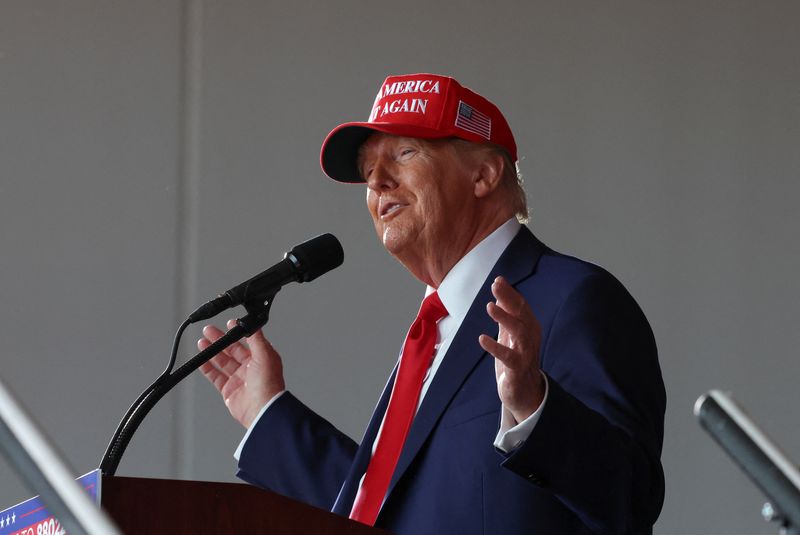In a recent rally in Juneau, Wisconsin, Republican presidential candidate Donald Trump intensified his protectionist trade stance by proposing tariffs as high as 200% on vehicles imported from Mexico. This dramatic increase from his previous commitment to a 100% tariff aims to support the struggling domestic auto industry, which could be impacted significantly by the influx of imports. Trump’s remarks come amid a competitive election landscape where he faces Democratic candidate Kamala Harris in a state where public opinion polls indicate she has a slight advantage. The importance of Wisconsin in the electoral college is paramount for both candidates, following its pivotal role in the outcomes of the last two presidential elections.
Trump’s focus on tariffs is part of a broader strategy to woo voters in key states like Michigan, Pennsylvania, and Wisconsin, where he previously performed well in the 2016 election. Despite losing to Biden in the 2020 election, Trump is ramping up efforts in these battleground states, recognizing their relevance to securing a path back to the presidency. His rallies, including the one in Juneau, represent not just campaign stops but strategic moves to regain traction in regions that have shown fluctuating support for Republicans and Democrats in recent elections.
At his Juneau rally, Trump’s remarks included sharp criticism of the Biden administration’s handling of recent natural disasters, particularly Hurricane Helene. He claimed that the administration had failed to respond effectively, leaving many people in dire circumstances. This is a strategic misstep for the Democrats as responses to disasters can heavily influence public perception and voting behavior during elections. In contrast to Trump’s allegations, Deanne Criswell, the head of FEMA, defended the administration’s efforts, asserting that resources are being allocated efficiently and dismissing claims that funds are being diverted for other purposes, especially regarding the controversial topic of illegal immigration.
In the context of the auto industry, Trump’s proposed tariffs reflect a long-standing concern about the impact of foreign competition on American manufacturing. Experts warn that such high tariffs could lead to increased prices for both new and used vehicles in the U.S., subsequently affecting consumer behavior and market dynamics. Mexico is a significant player in the automotive market, exporting approximately 3 million vehicles to the U.S. in 2023, with major American automakers relying on these imports. The potential implementation of such tariffs could disrupt established supply chains, leading to further complications for manufacturers and consumers alike.
The risks associated with imposing tariffs raise questions about the broader economic implications of Trump’s trade policies. Previous threats made by Trump regarding tariffs on auto imports suggested severe repercussions for the industry and the market overall, indicating a complex interplay between protectionist measures and consumer prices. The Tax Policy Center has expressed concerns that substantial tariffs could lead to increased costs for motor vehicles across the board, effectively burdening American consumers while attempting to protect domestic manufacturing interests.
As the November 5 election approaches, both Trump and Harris are likely to continue to focus on critical issues such as trade policy, economic recovery, and disaster response, as voters weigh these priorities against their perceptions of the candidates’ capabilities. With Wisconsin’s electoral stakes clear, both campaigns are pouring significant resources into outreach and engagement with voters, with Trump’s focus on protectionism representing a core pillar of his legislative agenda should he reclaim the presidency. The positions both candidates take on tariffs and their broader economic strategies will likely play a significant role in shaping the electoral landscape as voters make their final decisions in the lead-up to the election.

